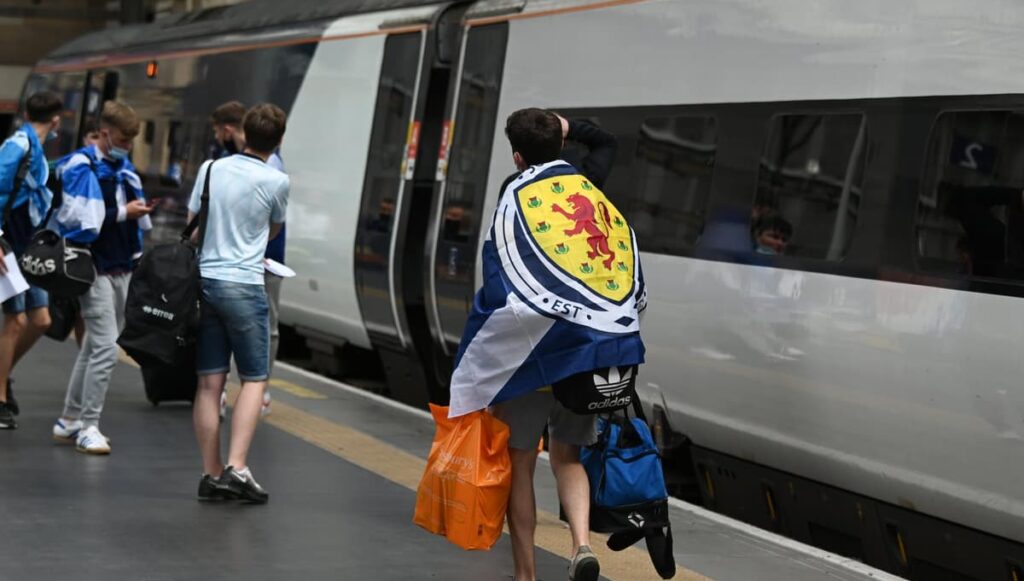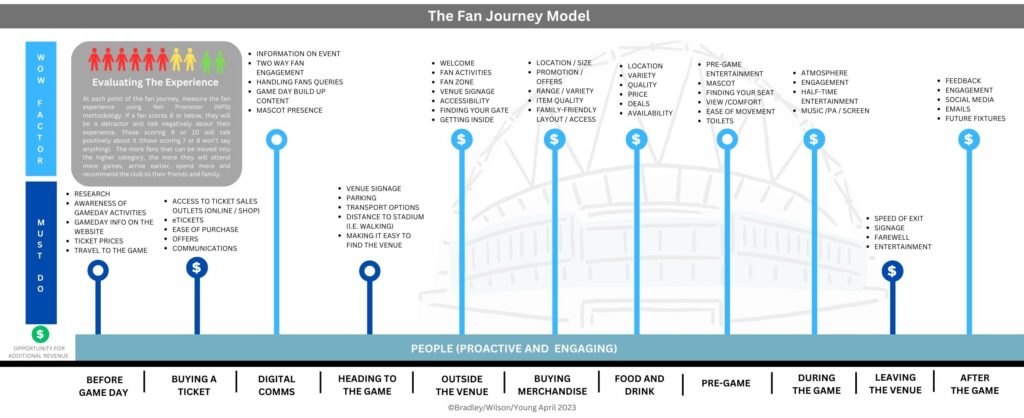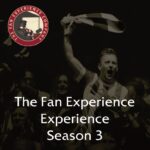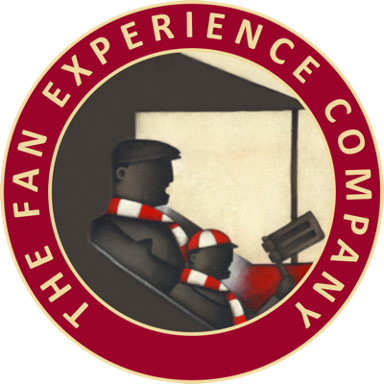© The Fan Experience Company 2023

The Fans Journey - Part 5: Getting To The Game
October 1983.
I walked to my first ever football game.
Not, I should add, completely by choice. It was a Saturday; my Dad was at work, my Mom didn’t drive and no-one else I knew could take me. There was the bus, of course, but it meant catching two and I had neither the budget or inclination for those kind of luxuries. So facing a three-mile-or-so hike, it came down to a straight choice between using Shank’s pony, or not going.
I’ve since travelled just about every way possible to games. Literally planes, trains, automobiles (a Triumph Spitfire was my first as a passenger) , a boat (Venice), a bicycle once (and never again), trams, buses and plenty more walking. You tend to take it for granted when you’re a bit younger: getting there is just a means to an end, right?
After all, does it really matter, as long as you do get there?

Mark Bradley
@fanexperienceco
Mark founded the Fan Experience Company in 2005 to build attendance growth and community engagement on the basis of improving fan experiences. He recently created FC Barcelona’s Barça Innovation Hub’s first fan engagement study certificate. The Fan Experience Company has undertaken more than 3,500 fan experience assessments in many countries for clients as diverse as The Danish Superliga, The EFL, The WSL / WC, United Rugby and Premiership Rugby.

Geoff Wilson
@fanexperienceco
Geoff runs his own Sports Consultancy, working with clients such as FIFA, UEFA, AFC and FIBA across the world. He is also on the board of Tourism Northern Ireland. You can follow Geoff on twitter @geoffwnjwilson connect on Linkedin at linkedin.com/in/geoffwnjwilson

Darren Young
@fanexperienceco
Darren joined the Fan Experience Company in 2017. He has an MBA with a background in customer service excellence having worked as a consultant in that field for a number of years. As well as being responsible for all of the assessment summary reports that are produced each season, he has also worked with a number of clubs on an individual basis, including Lincoln City, Walsall, Grimsby Town, Nottingham Forest and OH Leuven on projects ranging from staff development to supporter feedback surveys.
As part of a company that assesses the matchday experience, we have a real dilemma at least once every two years when we ask if the journey to the game is as important as the rest of it. We start off wondering if it should be weighted a little less, then we talk about it, think back to our experiences, chat with other assessors and by the end of it, decide it’s definitely as important.
If you are attempting to take a young child(ren) with you, it’s probably the most important. Everything about it spells potential issues. Parking becomes more important than the fitness of the club’s leading goal scorer, and getting away fairly quickly after full-time is at least on a par with the number of shots on target. Maybe one day the expected exit time will be used in the way expected goals is now.
Here’s how easy it should have been.
Clubs must have a similar problem. Just how important is travel? Remember they have a lot more things to worry about. Surely the fan can take the responsibility for getting to the ground themselves?
Well, yes and no.
It’s not really about that though. Most fans will take responsibility, but clubs still have to think about it from the fans’ perspective. They also have a lot to think about, and one of those thoughts might be ‘can I be bothered?’ It’s not the 80s now, and things have changed a bit.
There is a myriad of other things they could be doing now. Going to a game needs to be easy if it is to compare favourably with other leisure pursuits, like the cinema or doing nothing, both of which are considerably easier. The cinema (or multiplex) is a good example. They are usually situated out of town on large plots with ample free parking on safe and secure car parks.
So if we look online at the club website and it says ‘you can’t park here’ then that’s not a great start. It actually starts at the website and travel help is almost a pre-requisite now. But it quickly moves on to social media; live traffic updates and parking alternatives don’t half help fans. Of course, parking isn’t always easy (or possible) at stadiums so this is where clubs can get creative. But it’s really about making it as easy as possible for a fan to attend. If parking within a mile of the ground is mission impossible, then Mission Impossible 6 suddenly looks a much better alternative for a Saturday afternoon. Especially as Tom Cruise pretty much guarantees a great performance while your club mighty ship three goals before they even get to the interval (yes, I know cinemas don’t have them anymore, but it just worked better).
Beyond the digital support, a lot of our assessing takes place in the last mile. I’m not going to carp on about all that clubs can do, as every stadium has its own unique advantages and disadvantages but what I would urge every senior club representative to do is go out a mile or so from the ground and make the journey that a new fan would have to make. Is there adequate signage to find the place? Are the recommended parking options good ones? Are there others in case they are full?
This can be taken in all kinds of clever directions (see what I did there?). Car sharing, closer parking spaces for families, discounted deals with local NCPs and so on. I love the maps with concentric circles that not only tell fans how far they have to walk from town centres or local pubs, but can also highlight parking options too. And bear in mind that if the car parks have people from the club working at them, they will be the first person that the fan sees. The whole experience can be enhanced – or screwed up – right there. Don’t believe it? I’ve seen an argument with the car park attendant ruin an entire family day out.
At the other end of the scale, we saw first-hand how the travel aspect of the match day at the World Cup in Qatar was taken so seriously. Extremely helpful staff at all terminals, excellent and on-time transport, brilliant signage and staff with big foam pointy fingers in case you missed it. When there was no train line, special buses were laid on to get people there.
Yes, they had the benefit of plenty of money, but what was more apparent was that they had zeroed in on the getting to the game element of the fan journey as absolutely key. A happy fan that arrives early spends a lot more time (and money) at the stadium. It’s not an accident.
We shouldn’t forget what happens afterwards too. For many clubs, the interaction ends when the car wheels have left the car park, but fans still have to get home.
Travel disruption, especially for evening games – it’s as if the people in charge of the roads have a grievance against football fans – can be an issue with closures, diversions and in one particular example of our own, a road closure with a diversion onto another closed road. So if you can, tell fans.
I always used to smile when my own club used to announce, half way through the second-half of a night match that the last train from the nearby station would be leaving about ten minutes before the game was due to end. ‘But won’t they end up missing some of the match?’ I used to think.
It’s not the 1980s now. I’m a lot older and wiser. I’ve seen a lot of the games. When you go three consecutive Tuesday night games without having a shot, you have to be thankful for any small mercies.
So maybe those train companies knew exactly what they were doing, and if they did, they didn’t get anywhere enough credit for it.
Happy travels.


If you’d like help with this or other game day touch points, then make sure to listen in to The Fan Experience Experience podcast (on Spotify, Apple Podcasts and via Buzzsprout); to visit www.fanexperienceco.com or to email us via [email protected].
Mark Bradley, Geoff Wilson and Darren Young assessed the fan experience at eight matches at the 2022 World Cup in Qatar. Click here to read more about what they found there.
